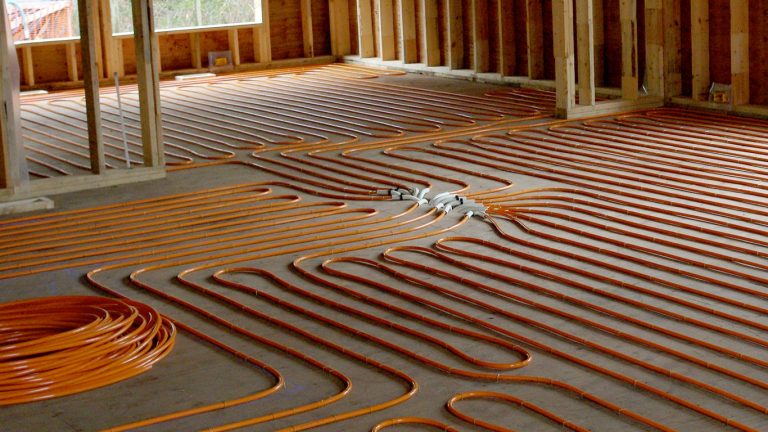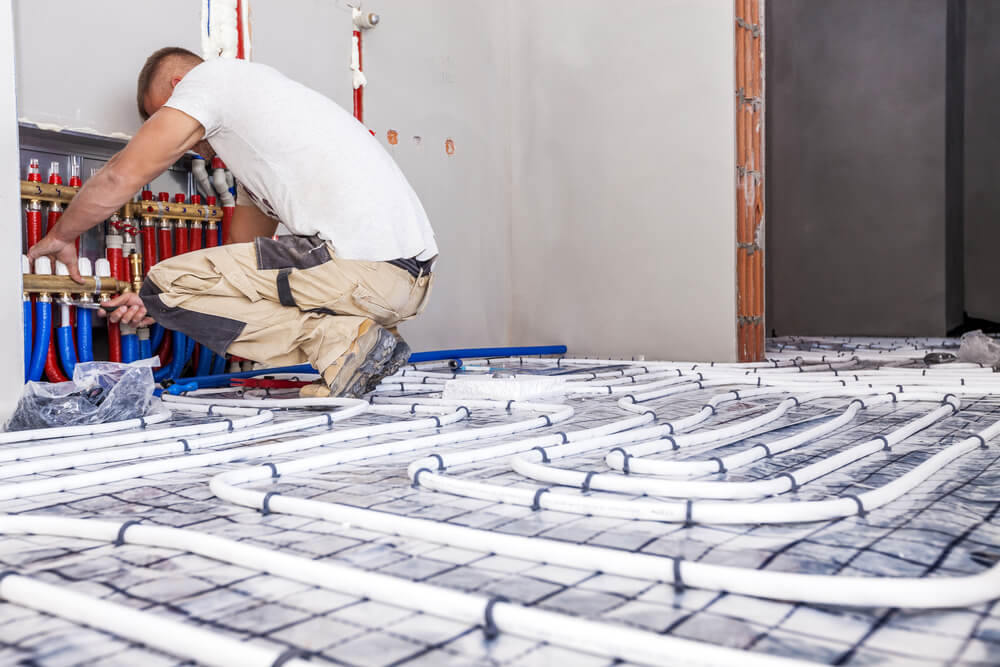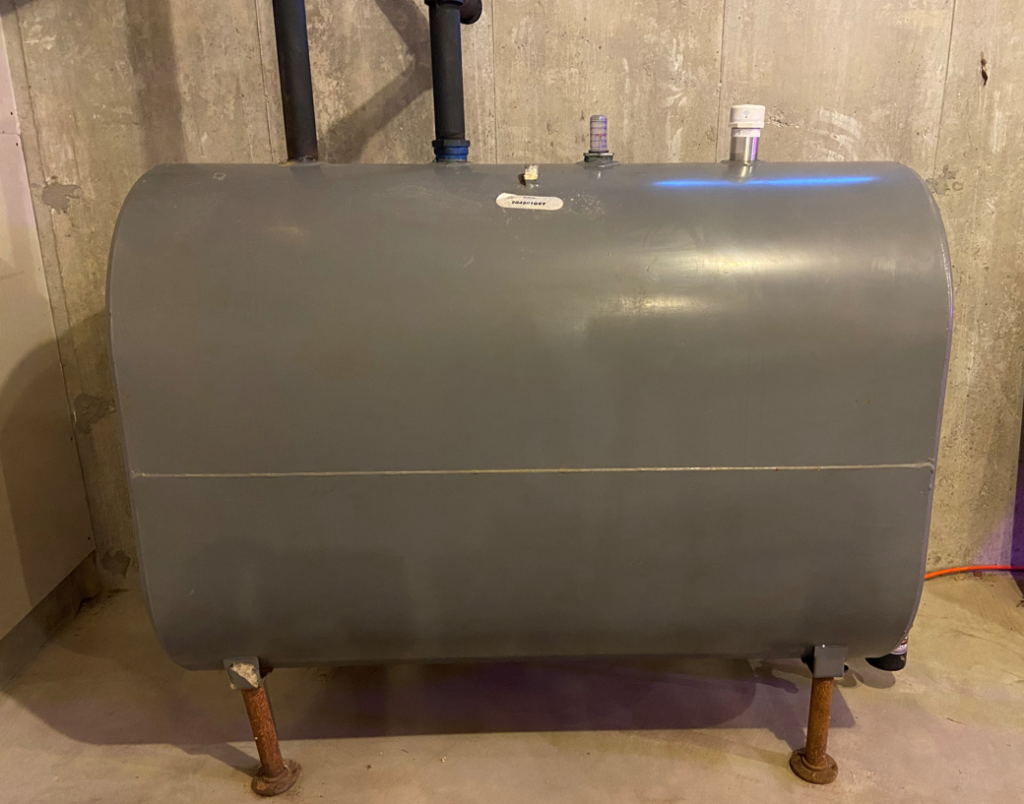Weather you’re building a new home or shopping for a new one, the question of home heating is very important. There are various different types of home heating but one I’d like to touch on is Radiant Heating.
Throughout the course of this article we will go over radiant heating in depth and see if it is better or worse than using a boiler
What is Radiant Heat?
Radiant heat is a form of heat that transmits through electromagnetic waves. There are two other forms of heating compared to this. They are conduction heating and convection heating.
A perfect example of Radiant Heat would be heat that is emitted from when you’re sitting by a fire. When you’re standing by a heat vent and feel the heating coming out from there, that is an example of convection heat. Finally, when you feel the heat coming off something you touch, that’s conduction.
Radiant heating in your home, will often be in the floors or walls. Hot water then travels underneath the surface of your floor. It will typically need to stay warm all day to keep the area warm. While it might sound odd, it is both popular and uncommon. You cannot install Radiant heating in an existing home, you must install it before you finish the floors.

The Benefits of Radiant Heating:
There are quite a few benefits to using Radiant heat. However, here are some examples:
Very Comfortable: The heat that is provided from Radiant heating is very warm. The surface of the floor becomes very warm and comfortable to walk on during the chilly winter months.
Provides Even Heat Distribution: When the Radiant heating system produces heat, it evenly rises throughout the room. It also is able to maintain a consistent warm temperature throughout all hours of the day. However, forced hot air will often produce patches of heat and cold throughout the room.
Has the Ability to Zone: One of the most useful tools that Radiant heat has is the ability to zone the heat to specific sections of the house. This allows you to have complete customization over where in the house the system will heat.
The Downsides of Radiant Heating:
Despite the many benefits to using Radiant Heating, there are a few downsides to it as well. Some of them include:
Very Complex and Expensive: Unfortunately, Radiant heating is by no means simple. It is a requirement to install before the floors are put in. It is also incredibly difficult to modify the house with Radiant heat. Additionally, compared to your standard oil heating radiant heating is very expensive to install.
Servicing is Difficult: Due to being underneath the flooring, servicing a radiant heating system is incredibly difficult. However, most of the issues with these systems in particular usually require boiler room service. So that is not huge concern.
Takes Longer to Heat Up: While Radiant heat warms the entire surface it is underneath, it . does take quite some time to warm up. It is not ideal for secondary homes where heating is only needed for a short period of time.
Needs Professional Installation: To prevent leaks and inconsistent heating problems, Radiant heat requires a professional to install. This is a requirement for it’s installation.

How Radiant Heat Compares to Heating Oil
Radiant heat is generally more inefficient than heating oil. However, you will be able to save more money in the long run with heating costs. The system will simply just need to be turned on for it to heat your house. It is also allergy safe! This means that it helps reduce the spread of allergens that could be affecting yourself or your children!
For Heating Oil however, you will still need to order every so often to make sure that you don’t run out. It is very important to stay on top of the amount of oil in your tank. This is because if you run out of oil in your tank, it could damage your boiler and cause serious issues in the future.
What are the Benefits of Heating Oil?
When comparing Heating Oil to radiant heat, it is often more efficient. It burns very hot which will often make the rest of the house nice and toasty. Heating Oil will also heat your home a lot faster than radiant heat. Radiant heat takes significantly longer than a boiler or furnace to warm up your home.
Heating Oil maintenance is also easier to get a hold of. This is because most HVAC technicians are familiar with heating oil compared to Radiant Heating. Your furnace and boiler also usually have a designated room in your home that is easily accessible. This allows HVAC technicians to have an easier time diagnosing the issue, so they will be able to fix the issue faster.
What are the Downsides of Heating Oil?
The biggest downside to heating is a fluctuation in price. While Radiant heating will not often change much price wise, heating oil does. Heating Oil often sees global changes in price depending on what’s happening globally. For example, last year when Russia invaded Ukraine, we stopped purchasing oil from Russia. As a result, our oil price increased drastically. Oil pricing also tends to fluctuate often during the colder months as it becomes more in demand.
Another major problem with heating oil, is that if you are not careful you will run out. When you run out of heating oil, you will likely wake up to a cold home. To prevent this, you will need to be on top of your oil level. Running out of oil can seriously damage your boiler or furnace. You can use either a standard float gauge or use a Smart Oil Gauge. Using either of these gauges will make sure that you don’t run out of oil.

Is Radiant Heat a Worthwhile investment?
If you are building a new home and are considering to use this as your main source of heating, then I highly recommend it! But, it is important to know that it is expensive to install. This is balances out by saving money on heating oil costs. Considering that Oil tends to fluctuate in price frequently, this could help you in the long run.
However, if your home is already a home that uses a furnace or boiler, it isn’t worth the hassle to try to find a new home or seek a way to install Radiant heating into your home. Instead, be sure to use the FuelSnap website to get the most up to date deals on heating oil in your local area!
If you’re curious on other sources of heating, be sure to check out our articles on Heating Oil vs Heat Pumps and Granby Tanks vs Roth Tanks. We go in depth in both of these topics to ensure that you get the best out of your heating oil!
Happy Heating,
Hunter



